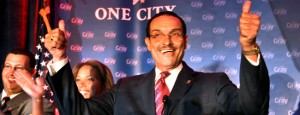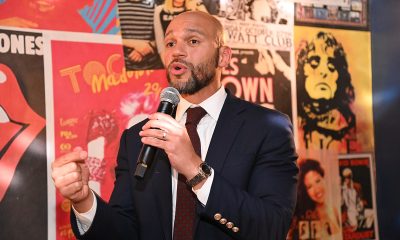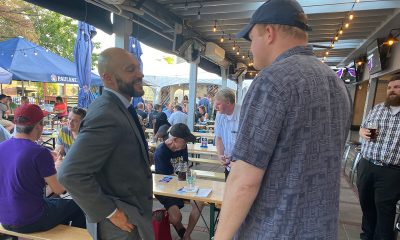Local
Activists hail Gray’s stunning win over Fenty
But mayor carries precincts with high concentrations of LGBT voters
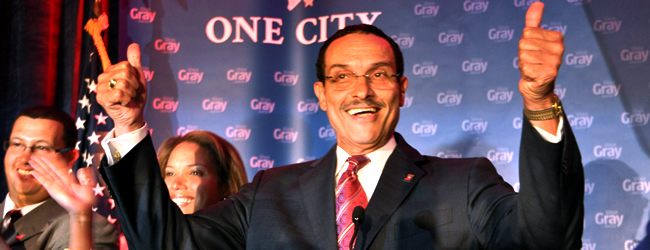
The large contingent of LGBT activists that backed City Council Chair Vincent Gray’s candidacy for mayor called his victory in Tuesday’s Democratic primary a highly positive development and predicted Gray would emerge as one the city’s most gay-supportive mayors.
But early election returns showed that Mayor Adrian Fenty won in most of the voter precincts with a high concentration of LGBT residents.
Final-but-unofficial returns released early today by the D.C. Board of Elections and Ethics showed Gray defeating Fenty by a margin of 54 to 45 percent.
Lesser known Democratic mayoral candidate Leo Alexander, who made his support for a ballot measure to overturn the city’s same-sex marriage law an important part of his campaign, received less than 1 percent of the vote. Democratic mayoral contenders Sulaimon Brown and Ernest Johnson, who received a 0 rating from the Gay & Lesbian Activists Alliance on LGBT issues, also received less than 1 percent of the vote.
Jeffrey Richardson, president of the Gertrude Stein Democratic Club, the city’s largest LGBT political group that endorsed Gray, said many activists favored Gray because he demonstrated a stronger commitment to work with and listen to the problems and concerns of the LGBT community.
“What I believe happened is Vince Gray resonated with and connected with the idea that we not only need a mayor who is going to bring us results but who has a heart for the community and has shown that heart and is willing to be connected to the community and to hear from the citizenry,” Richardson said.
Both Gray and Fenty have strong records of support on LGBT issues. Gray voted for and Fenty signed the city’s historic same-sex marriage law.
Gay Democratic activist Peter Rosenstein was among a number of LGBT advocates who backed Fenty in his landslide victory in the 2006 election and switched their allegiance to Gray this year.
Rosenstein said he believes the gay vote split between Fenty and Gray, with a “large majority” of black gays joining the black community as a whole in voting for Gray. Stein Club Vice President Tim Mahoney is among a number of activists who believe most gay voters based their decision on who to back in the mayor’s race on non-LGBT issues.
In other city races, gay former parks and recreation director Clark Ray was trounced in his uphill challenge to LGBT supportive at-large Council member Phil Mendelson. Mendelson won his bid for the Democratic nomination with 63 percent of the vote, with D.C. shadow senator Michael D. Brown coming in second, with 27 percent and Ray finishing third with just under 9 percent of the vote.
The Stein Club endorsed Mendelson over Ray, calling Mendelson a “champion” on LGBT issues and noting that he led the City Council’s effort to pass the same-sex marriage law in his role as chair of the committee with jurisdiction over the measure.
Election returns also show that Mendelson, who won in all eight wards, beat Ray and Brown with overwhelming margins in the gay identified precincts, including those in Dupont Circle, Logan Circle, Adams Morgan, Capitol Hill, the Southwest Waterfront, and Anacostia.
Gay City Council member Jim Graham (D-Ward 1) won his primary race with 57 percent of the vote. Democratic challengers Jeff Smith and Bryan Weaver each received 21 percent of the vote, according to the latest Board of Elections returns.
LGBT-supportive Council member Kwame Brown (D-At-Large) won the Democratic nomination to replace Gray as City Council chair with 55 percent of the vote. Challenger Vincent Orange, a former Ward 5 Council member who opposed same-sex marriage four years ago before coming out in support of the marriage equality bill this year, received 39 percent of the vote.
Many of the city’s LGBT leaders were especially pleased with Ward 5 Council member Harry Thomas Jr.’s primary victory Tuesday. Same-sex marriage opponents, including the anti-gay National Organization for Marriage, targeted Thomas for defeat in his conservative ward. Many political observers said Thomas’s decision to vote for the same-sex marriage law put his re-election bid in jeopardy due to strong opposition to the law among many of his constituents.
Thomas won the primary with 62 percent of the vote. His lead opponent, Delano Hunter, who spoke out against the marriage equality law and backed a voter initiative to overturn it, received 19 percent of the vote.
The LGBT-supportive group People for the American Way, which keeps track of anti-LGBT groups, pointed to city election finance records showing that the group spent well over $100,000 to support Hunter in Ward 5 and general efforts to oppose Council candidate supportive of same-sex marriage.
“They spent a lot of money and completely failed,” said gay activist Bob Summersgill. “I think NOM has completely misunderstood the attitudes and feelings of the voters in D.C. This is not a place where people are anxious to take away others’ rights.”
LGBT supportive Council members Mary Cheh (D-Ward 3) and Tommy Wells (D-Ward 6) easily won re-nomination for their respective seats. Cheh ran unopposed and Wells captured 75 percent of the vote against challenger Kelvin Robinson, who said he would have voted against the same-sex marriage law “as written.” He said he now supports the measure as the “law of the land.”
D.C. congressional Del. Eleanor Holmes Norton (D) also won by a lopsided margin. Norton is considered one of the most LGBT-supportive members of Congress.
The only Stein Club-endorsed candidate who lost in Tuesday’s primary was Nate Bennett-Fleming, a 26-year-old law school student and Ward 8 community activist who challenged incumbent D.C. shadow representative Mike Panetta. Bennett-Fleming campaigned aggressively for LGBT support, expressing strong support on virtually all LGBT related issues.
Panetta, who also supports LGBT equality, including same-sex marriage, won the race by a margin of 57 to 41 percent.
In the primary for the city’s tiny Statehood-Green Party, gay minister Darryl Moch lost his bid for the nomination for the at-large Council seat currently held by Mendelson. Statehood-Green Party activist David Schwartzman, a strong supporter of LGBT rights, beat Moch by a margin of 63 percent to 27 percent.
Two gay Republican Party candidates won nomination to City Council seats in unopposed races. Marc Morgan will challenge Graham for the Ward 1 Council seat in the November general election. Gay GOP candidate Tim Day will challenge Thomas for the Ward 5 Council seat in November.
Richardson and other LGBT activists who supported Gray said that similar to their straight counterparts, they believe Fenty — while supportive on LGBT issues — appeared to ignore the concerns they expressed over a number a newly developing issues, including the growing number of anti-LGBT hate crimes.
The local group Gays & Lesbians Opposing Violence joined other groups, including the Gay & Lesbian Activists Alliance and the D.C. Trans Coalition, in criticizing Fenty for refusing to meet with them or attend LGBT events to discuss pressing issues.
Transgender activists also expressed concern that Fenty was not taking their issues seriously, especially when the mayor’s office startled LGBT activists by proposing to exclude transgender inmates in the city’s correctional system from the D.C. Human Rights Act. Corrections department officials said the exclusion was needed for security reasons and was related to whether trans inmates should be allowed to dress in accordance with their biological gender or the gender to which they were transitioning.
The mayor’s office dropped that proposal following a groundswell of opposition.
Sources familiar with the demographics of the so-called “gay” precincts said they have large numbers of non-gay residents and it is impossible to determine what portion of the gay vote went to Fenty or Gray. The gay-identified precincts are also located in the predominately white sections of the city in Wards 1, 2 and 6, which Fenty won.
Nearly all LGBT activists familiar with voter demographics agreed that black LGBT residents, who are dispersed throughout the city and not concentrated in individual precincts, voted overwhelmingly for Gray.
“Anecdotally, I can’t name five black gays who voted for Fenty,” said gay Democratic activist Phil Pannell, who is active in the city’s predominantly black Ward 8.
Pannell said that the gay vote — like the citywide vote as a whole — appears to have divided along racial lines, with most white voters going for Fenty and most blacks voting for Gray.
“I definitely think Vince Gray is going to bring us all together,” Pannell said. “But it’s still sad to see we are racially divided at the ballot box.”
A number of political observers have said Clark Ray’s loss to Mendelson in Tuesday primary may not be the end of his quest to be the Council’s third out gay member. With Kwame Brown winning the Democratic nomination for the Council chairman’s seat, Brown’s at-large seat is expected to become vacant in January if he wins in the November general election, as expected.
The Board of Elections is expected to call a special election to fill the vacant seat early next year, and Ray has said he would consider running for the vacant seat if he lost to Mendelson. A number of LGBT activists who backed Mendelson have said they would look favorably toward a Ray candidacy for the vacant seat.
District of Columbia
Wanda Alston Foundation names new executive director
Longtime LGBTQ rights advocate Cesar Toledo to succeed June Crenshaw
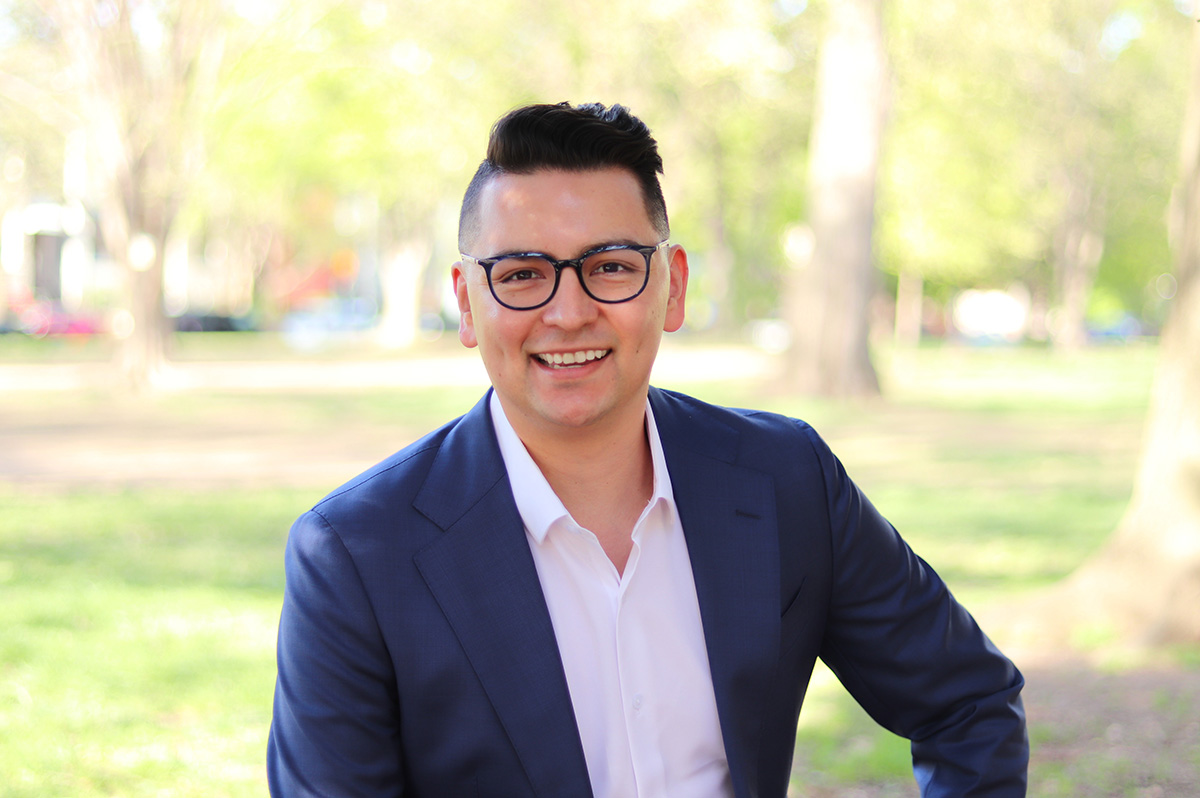
The Wanda Alston Foundation, the D.C.-based organization that has provided housing and support services for homeless LGBTQ youth since its founding in 2008, announced it has appointed longtime LGBTQ rights advocate Cesar Toledo as its new executive director.
In an April 22 statement, the organization said that as part of a planned leadership transition launched in November 2024, Toledo will succeed June Crenshaw, who Alston Foundation officials and LGBTQ community activists say has led the organization with distinction in her role as executive director for the past nine years.
In a statement released last November, the foundation announced Crenshaw was stepping down from her role as executive director after deciding to “to step into her next chapter.”
“June’s leadership has been truly transformative,” said Alston Foundation Board Chair Darrin Glymph in the group’s April 22 statement. “We are immensely grateful for her dedication and equally excited for the energy and experience that Cesar brings to lead us into this next chapter,” Glymph said.
“A seasoned LGBTQ+ advocate, Cesar brings over a decade of experience leading national campaigns, shaping public policy, and building inclusive communities,” the statement released by the group says. “Most recently, he served as the National LGBTQ+ Engagement Director for the Harris for President Campaign and has built a career focused on advancing equality and equitable education,” it says.
Biographical information about Toledo shows that immediately prior to working for the Harris For President Campaign, he served since April 2023 as deputy director for Democrats for Education Reform DC (DFER DC), a political group that helps to elect candidates for public office committed to quality education for all students, including minorities, people of color and LGBTQ youth.
Before joining DFER DC, Toledo served as political director for the LGBTQ+ Victory Fund, where he assisted in electing out LGBTQ candidates to all levels of public office across the U.S.
“I’m really excited about joining the Wanda Alston Foundation,” Toledo told the Washington Blade. “After a decade of working at the intersection of politics and policy and advancing political candidates and equitable education here in D.C., I wanted to shift my career to direct services to the most vulnerable folks in the LGBTQ+ family and our homeless youth,” he said.
Among other things, he said he would push for increasing the Alston Foundation’s visibility and mainlining its services for LGBTQ youth at a time when the national political climate has become less supportive.
A statement on its website says the Alston Foundation was founded in 2008 “in memory of Wanda Alston, a fierce LGBTQ+ activist, national advocate, and government official who was admired by District residents.”
The statement adds, “The foundation opened the first housing program in the nation’s capital in 2008 providing pre-independent transitional living and life-saving support services to LGBTQ+ youth.”
In a separate statement, the Alston Foundation announced it would hold a “thank you” celebration of appreciation for June Crenshaw from 6-8 p.m. on May 20 at Crush Dance Bar located at 2007 14th Street, N.W. in D.C.
“Let’s come together to celebrate her dedication and commitment for everything she has done for the LGBTQIA homeless youth population,” the statement says.
Virginia
Gay talk show host wins GOP nom for Va. lieutenant guv
John Reid becomes first out gay nominee for statewide office in state
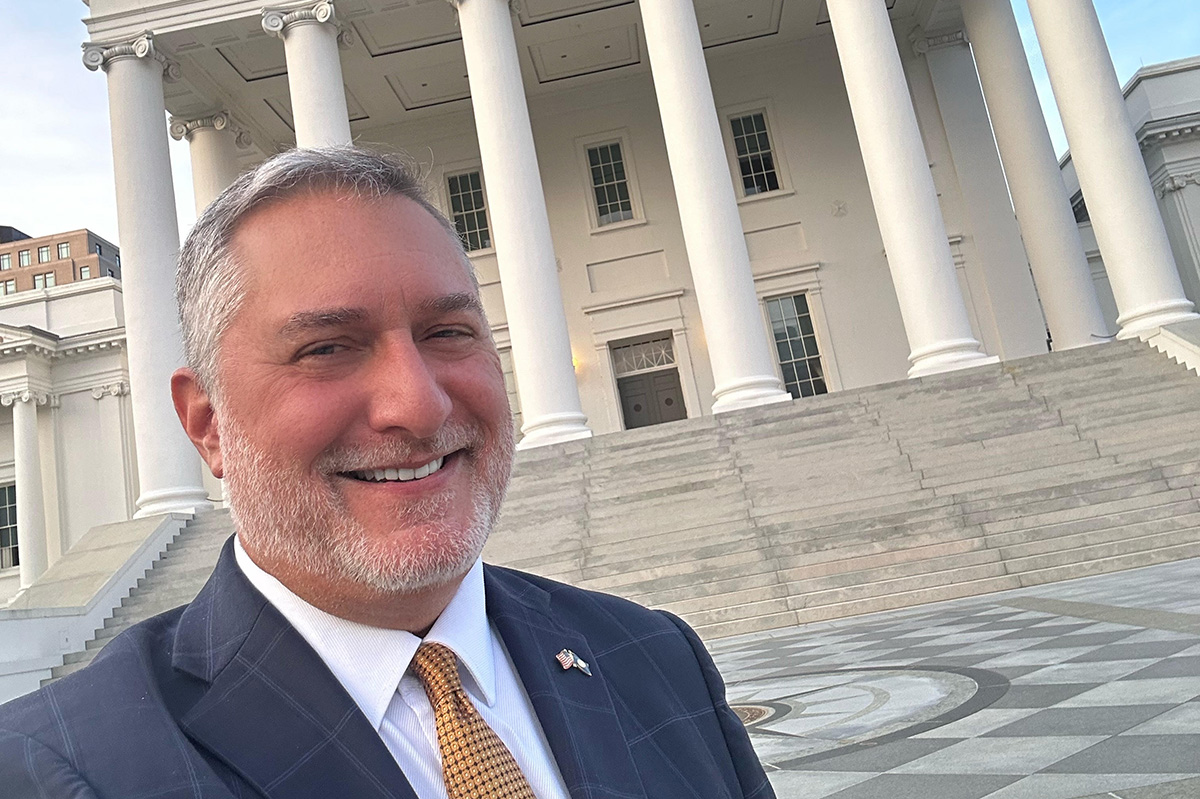
John Reid, a conservative gay radio talk show host in Richmond for many years, this week secured the Republican nomination for the office of lieutenant governor in Virginia, becoming the first known openly gay person to be nominated for a statewide office in that state.
Reid secured the nomination after his only rival in the Republican primary, Fairfax County Supervisor Pat Herrity, dropped out of the race this week for health reasons.
Herrity’s decision to withdraw from the race finalized the GOP nominees for Virginia’s three statewide contests in the November general election in what political observers are calling an unusually diverse GOP slate.
Current Virginia Lt. Gov. Winsome Earle-Sears, a Black woman, captured the GOP nomination for governor without a GOP opponent. Jason S. Miyares, a Hispanic man, is running for re-election as Virginia attorney general without a GOP rival. And Reid, a gay man, is the GOP nominee for lieutenant governor.
Reid will face one of six Democratic candidates for lieutenant governor who are competing in the June 17 Democratic primary.
The Blade spoke with Reid on Tuesday. Below is a partial transcript of that interview.
Blade: Is there a message you have for LGBTQ voters in Virginia, including Democrats, for why you think they should vote for you?
Reid: Well, the thing that I would say to gay voters who are looking and examining the candidates, is that I was out of the closet as a gay Republican publicly in very difficult rooms where people weren’t accepting of gay men – long before Donald Trump said I don’t care about this stuff.
And long before polite society said this was OK. So, in the ‘90s I came out on television and said on Oct. 11 – it was on National Coming Out Day. It was probably in 1996 or 1997. I started at the TV station in 1994. So, it was a couple of years into it.
I came out and said you never know your news anchor could be gay on National Coming Out Day. And everyone was appalled. How can you say this? You’re not supposed to say something like that. So even though I’m a Republican I know some people in the LGBT community are reflexively hostile to Republicans.
I took that step in public, and I think I helped change a lot of minds within the Republican Party and within central Virginia, which continues to be a pretty conservative place by being true to who I am. I spoke out in meetings around Republican staff and legislators and said I think we are not doing the right thing by being hostile to gay marriage.
We talk about the importance of family – Republicans talk about the importance of family, the importance of marriage as a fundamental building block of society. And a gay marriage is a net positive. Is it biblical to people who are following traditional Christian theology? No. But is it good for our society to have people in committed relationships? I think yes.
When we were going through the debate over gays in the military I said I see no reason that someone who is qualified to be in the military and can meet every single standard that everyone else is asked to meet, why should they not be in the Naval Academy, the Air Force Academy, West Point? Or serving as a grunt in active duty. Why would we exclude those people?
And those were very unpopular positions within the Republican Party.
Blade: Your campaign website says you have supported civil unions for same-sex couples. I could have missed seeing it, but I didn’t see an expression of support for gay marriage. Are you saying now that you support full same-sex marriage?
Reid: You know, you’re right. There is a distinction. And I think marriage is completely legitimate. Civil unions – if you want to go and sign paperwork at the courthouse – that’s great. If you want to be married and if a church wants to marry you if you find a church and religious leader and group that wants to bless that – that’s what I hope to do with my partner now.
Sometime in the near future I hope we will be married. And it’s very important to me as a Christian to be married in a church. So, that’s interesting. Most people would not draw that distinction. I appreciate that you’re drawing a distinction. I’m supportive of both.
Blade: Did you say you worked for a member of Congress? Can you say who that was?
Reid: George Allen, the senator from Virginia. And, of course, you and I – I know you’ve covered so many stories like this that you’ve brought together. But it was a very difficult position. When I started with Sen. Allen, he had a very libertarian attitude about this. The [Virginia State] constitutional amendment was not necessary. There was no need to go down that road.
And of course President Bush – George W. – was very assertive during the 2004 campaign. And then the issue continued to bubble up and you know we wound up with this amendment in the Virginia Constitution that banned gay marriage until the Supreme Court decision. And I was not supportive of that. And I voted for my boss, my senator, who I respected and still do respect.
Blade: Your website shows that your support for the gay community does not extend to the transgender community.
Reid: Yeah, I hate this. But I do think that our current focus on trans issues is where the gay rights movement has jumped the shark. And I think we’re losing support that we worked very diligently for decades to build with the average person. And I’m puzzled that the former leaders of the Human Rights Campaign had presidents when Elizabeth Birch and others – I don’t know what their stance is today.
I do recall that all of us who talked about gay rights issues focused on normalcy and that we would meet every standard that everyone else met. That all the vile things that were said about gays being pedophiles and grooming children – that simply was not true.
And I think we have stumbled into a very unfortunate and dangerous territory where we’re almost taunting the average person with an insistence that they accept drag queen story hour and the provocative books and provocative media that the average person would say, ‘You told us you were normal. – quote unquote normal – and now you are peddling an agenda which we don’t agree with and you’re being really aggressive about it.
And that’s really a difference. I know you’ve been covering it for a long time. I don’t know if you agree with this. I think we are peddling a very different political agenda today than the gay community was 20 years ago. And I think we should restrain ourselves and be cautious about that. And I think we’re in dangerous territory with the general population. And I’d urge caution about that.
Blade: Online reports show that there are as many as six Democratic candidates competing for the lieutenant governor’s position in the June 17 Democratic primary. Do you know any of them?
Reid: I’m familiar with most of them. Some are from the Richmond area. And I believe they are all very supportive of gay rights, which is I think a good thing. My reason for challenging them as a Republican – and I think there are other places where there is a lack of appropriate leadership and good judgment. And so, I don’t expect the gay issue would be a real issue. The trans issue may be a point of contention in the race.
But I don’t think the gay issue – and I do draw a distinction between the two — I don’t think that will be a real dividing line with those Democrat[ic] candidates.
Blade: So unlike when you were a TV news anchor, on your radio talk show were you able to offer more opinions and commentary?
Reid: That’s correct. There was a lot of opining, no script. So, I was able to tell stories about how I traveled to Miami, and I went to Washington. I went to the Kennedy Center and shared some of my life and lifestyle as appropriate with the audience.
Blade: Well, thank you for this interview.
Reid: I’m happy to talk to you. One of the reasons I called you back is that the political consultants have always told me don’t talk to anybody that might disagree with you. And I reject that. I have already lived 30 years as an out gay man. And it has been very difficult. And I would like to make it easier for the next generation to live their authentic selves. … Calling you and talking to you against the advice of all these people who say never do that, I’m hopeful that my willingness to engage and be candid will ultimately be well received, I hope.
District of Columbia
New DC LGBTQ Center to celebrate grand opening
Permanent location in Shaw debuts with Saturday celebration
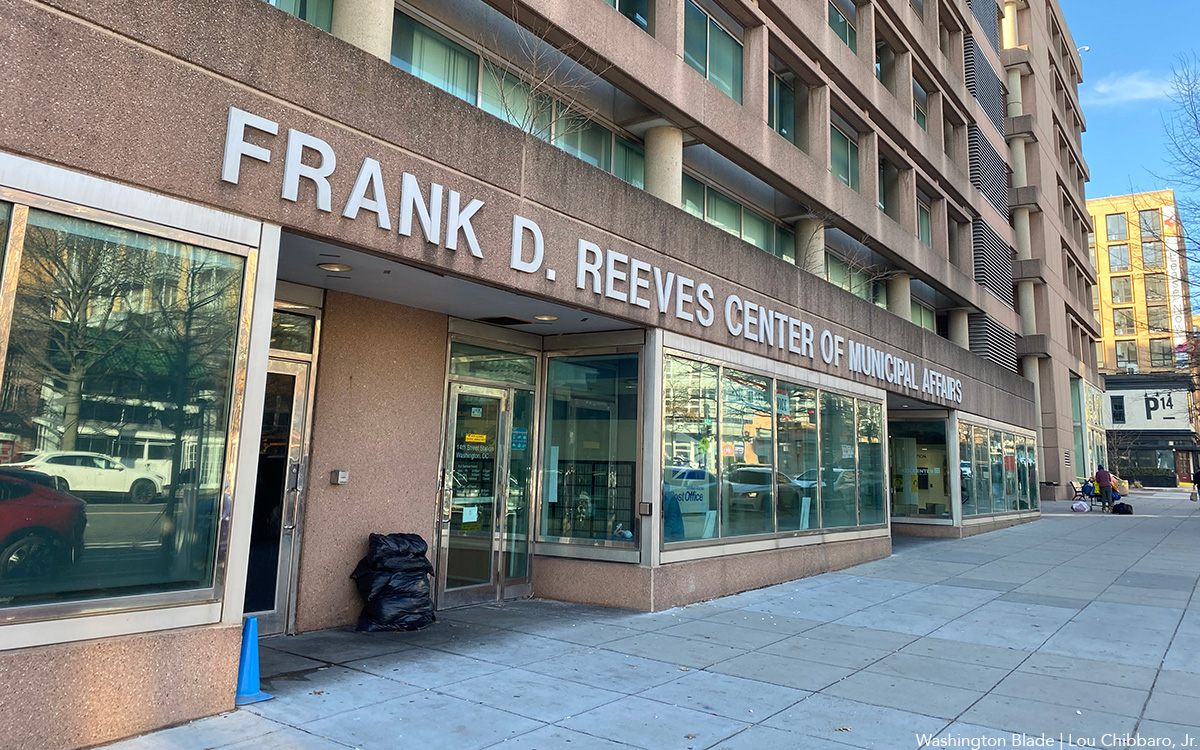
After more than 20 months of demolition, construction, and development, Washington finally has a brand new LGBTQ Center. On Saturday, April 26, the doors will officially open at the DC LGBTQ Center for the first time following the groundbreaking in June 2023.
The new DC LGBTQ Center, located one block from the Shaw Metro station, aims to educate, empower, uplift and celebrate Washington’s LGBTQ community. Spanning 6,671 square feet of intentionally designed space, the center will offer a wide range of resources for LGBTQ individuals in need – including mental health services, job readiness programs, cultural events and community support groups, all under one roof.
The space, located in The Adora building at 1828 Wiltberger St, N.W., has a food pantry, STD and HIV testing space, therapy room, boutique with a clothing closet, an ADA-accessible shower, a mailroom to help those without an address receive mail, and a large kitchen.
The new DC LGBTQ Center will also house office space for nine local LGBTQ organizations. Groups like SMYAL, which supports and uplifts LGBTQ youth, and the Wanda Alston Foundation, which provides transitional housing and support services for homeless or at-risk LGBTQ youth, are central to the center’s mission: to educate, empower, uplift, celebrate, elevate and connect Washington’s LGBTQ community. The center will also become the new home of the Capital Pride Alliance, the organization behind Capital Pride and this year’s WorldPride celebration.
The Reeves Center, the former home of the DC LGBTQ Center, is slated for redevelopment. Located at 14th and U streets, N.W., the building is expected to become a mixed-use hub featuring the NAACP’s national headquarters, a hotel, restaurant, comedy club, housing and more.
On Saturday, the new DC LGBTQ Center will celebrate its grand opening with a full day of events designed to showcase the space’s potential and mark its long-awaited return. The “Friends & Family Day” celebration begins with a brunch at 10 a.m., followed by an open house featuring tours, team introductions, and a look at how the center came to life. The day concludes with a “Honey, I’m Home” cocktail celebration at 5 p.m.
Some events are open to the public, while others, such as the brunch, require an RSVP. To RSVP, visit this link or email [email protected] with any questions.
-

 U.S. Federal Courts4 days ago
U.S. Federal Courts4 days agoFederal judge blocks Trump passport executive order
-

 Obituary5 days ago
Obituary5 days agoLocal attorney, LGBTQ rights advocate Dale Sanders dies at 75
-

 Mexico5 days ago
Mexico5 days agoGay couple claims Puerto Vallarta wedding venue discriminated against them
-

 Books4 days ago
Books4 days ago‘Pronoun Trouble’ reminds us that punctuation matters

